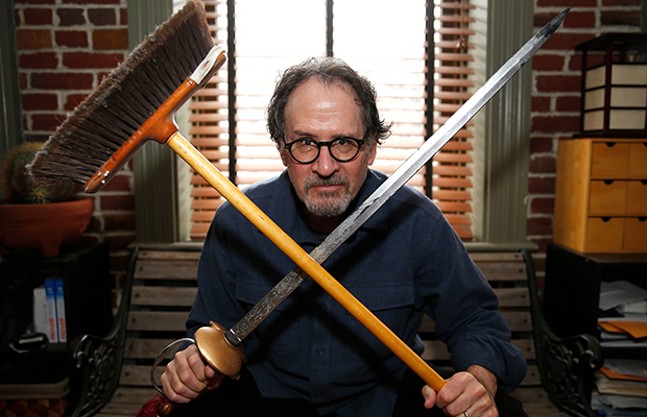Community, Leadership, Experimentation, Diversity, & Education
Pittsburgh Arts, Regional Theatre, New Work, Producing, Copyright, Labor Unions,
New Products, Coping Skills, J-O-Bs...
Theatre industry news, University & School of Drama Announcements, plus occasional course support for
Carnegie Mellon School of Drama Faculty, Staff, Students, and Alumni.
CMU School of Drama
Friday, January 18, 2019
Subscribe to:
Post Comments (Atom)

4 comments:
My favorite articles to read are ones about jobs in theatre which I don’t know very much about. And I really don’t know much about fight direction. I found this very interesting because I liked reading about his favorite kind of fights to do. His answer was for the most part what I would have expected about fights with unusual weapons, but I really liked his answer about enjoying the fights where the audience expects something to happen and then something completely different happens. I think this is an idea that is wildly spread throughout many different areas of design and art, and for the most part, I do think the audiences appreciate when they are surprised and not everything is expected. Something I did not expect to have read was that he lets the actors make a lot of decisions on the action of the fight with their impulses. I would have guessed that fight directors come into rehearsal with a very secure plan of what will happen during the fight for safety reasons. So it was very interesting to read that in reality that is not always the case.
I have always thought fight choreography is one of the coolest jobs you can do in the entertainment business. I was lucky enough to have been taught a stage combat class a few years at my high school, and the process is super cool. I’ve assistant stage managed a show at a local theater that used weapons, and like this guy, some of the weapons were weird and unexpected. The process he describes in the article about just wanting to repulse the audience in an unexpected way with his fights is jarring in a great way. I’ve been to shows with terrible fight choreography, and I’ve also been to shows that the fights look so real, I’m sinking into my seat. One day, I would love to work with fight choreographers in my career, management wise and maybe even assisting them one day. It really is an overlooked field within theater, but the need is heavy, especially because of actor safety.
The first thing that caught my eye was that Randy Kovitz was the Fight Director on “Dark Play,” which I will be on run crew for this semester! I am excited to see how his work displays on stage, especially since I do not know much about the show as of now. I begin to wonder how his work will be incorporated into the play, as I have found that fight scenes are always a great focal point of plot advancement when they’re executed well. Stage fighting seems to be an art far out of my reach, but reading Kovitz’s journey with it has brought it closer to home. He uses a lot of the same techniques to choreograph as a designer would use, and I suppose the two things are much more similar than I first thought. His personal connection to his work is honestly quite terrifying, but I see how it would fuel him to create the most real atmosphere of violence that he can with his choreography.
One of the questions that this article raises for me is when Randy Kovitz mentions that he isn’t part of any organization. I wonder if there is a union of just fights directors. I feel like in the coming years there will be and sensitive content directors will be a part of this union as sensitive content and fight directors are becoming more and more as time goes on. What Kovitz says in his interview about how he wants to feel the bunch is a little scary to me. He seems not to worry about triggering audience members and actors and seems a lot to be keen on violence. This makes sense for selling the story but he seems a little blasé about its impact. I might be an oversensitive millennial but he seems to not care about triggering the audience, which probably happens a lot with theatrical violence. Overall, I didn’t learn a lot about the day to day of a fight director but I did get a lot of insight into Randy Kovitz’s mindset.
Post a Comment